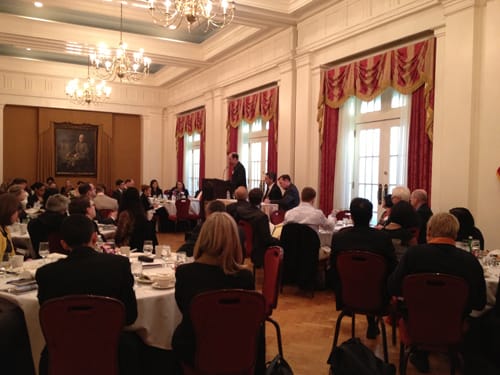RFIA Presents Robert Hefner Lecture: “Shari’a, Democracy, and Human Rights”
 On 6 February 2013, The Review of Faith & International Affairs sponsored “Shari’a, Democracy, and Human Rights: Debates and Policy Implications,” a luncheon lecture by Dr. Robert W. Hefner. A prolific author and eminent scholar of Islam and politics, Dr. Hefner is Director of the Institute on Culture, Religion, and World Affairs at Boston University. Dr. Hefner’s lecture presented findings and recommendations derived from a special issue of The Review of Faith & International Affairs that he guest-edited on “The Rise of Shari’a: Implications for Democracy and Human Rights.“Dr. Hefner also fielded questions from the diverse audience of scholars, practitioners, policy makers, and journalists in attendance. Video of the lecture and q-and-a is available here.
On 6 February 2013, The Review of Faith & International Affairs sponsored “Shari’a, Democracy, and Human Rights: Debates and Policy Implications,” a luncheon lecture by Dr. Robert W. Hefner. A prolific author and eminent scholar of Islam and politics, Dr. Hefner is Director of the Institute on Culture, Religion, and World Affairs at Boston University. Dr. Hefner’s lecture presented findings and recommendations derived from a special issue of The Review of Faith & International Affairs that he guest-edited on “The Rise of Shari’a: Implications for Democracy and Human Rights.“Dr. Hefner also fielded questions from the diverse audience of scholars, practitioners, policy makers, and journalists in attendance. Video of the lecture and q-and-a is available here.
The lecture was held at the Army-Navy Club (one from the White House), a venue that both substantively and symbolically underscores that the role of religion in public life is not just a matter of “soft power” but is also inextricably related to hard power; for good or ill, religion and realpolitik are always interrelated. By design, this invitation-only event brought governmental and grassroots leaders together. To borrow from the lingo of diplomacy, the event represented a creative intersection of “Track 1” and “Track 2″— i.e. “Track 1.5” engagement.
At the event Dr. Hefner also presented a new model syllabus on shari’a, democracy, and human rights, which he co-authored with Dennis R. Hoover. This syllabus addresses questions about the place of the shari’a in modern politics, and its implications for citizenship, religious tolerance, and the modern profession of Islam. The outline can be used as the basis of a freestanding course, while the separate modules may be integrated as needed into other related classes. Click here to download the syllabus.
The special issue of The Review, Dr. Hefner’s lecture, and the model syllabus are part of an ongoing series funded in part through the support of a grant from the John Templeton Foundation. The views expressed are those of the authors/speakers and do not necessarily reflect the views of the Templeton Foundation.